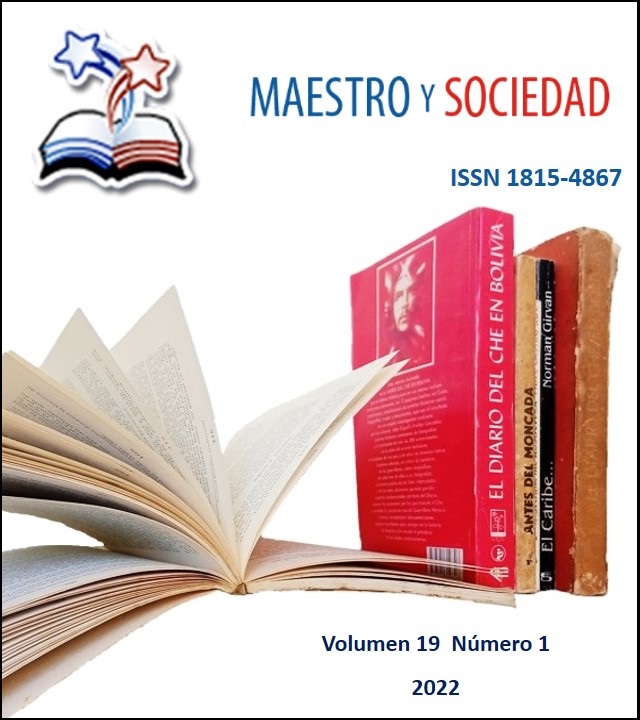Intercultural District Educational Networks as a socio-pedagogical strategy in education
Array
Keywords:
Networks, interculturality, teaching performanceAbstract
The purpose of this article is to disseminate the experience of the organization and operation of the Intercultural District Educational Networks (REDI) as a socio-pedagogical strategy for education, which contributes to the improvement of the quality of the educational service of Basic Education students Regulate in the jurisdiction of the Chicha river slope; action implemented as a practice that mobilizes all educational actors. For the design and systematization of the experience, the convergence of quantitative and qualitative methods has been chosen. The results of the experience range from pedagogical mobilization to form and organize the REDI, strengthen their capacities with Intercultural Bilingual Education, support and advice in the context of pedagogical practice and articulated assistance to local governments. The REDIs articulate spaces for the improvement of the performance of teachers and managers in their application.
References
2. Deroncele Acosta, A., Gross Tur, R., & Medina Zuta, P. (2021). El mapeo epistémico: herramienta esencial en la práctica investigativa. Universidad Y Sociedad, 13(3), 172-188. https://rus.ucf.edu.cu/index.php/rus/article/view/2088
3. Deroncele, A. (2020). Competencia epistémica del investigador. En A. M. de Vicente Domínguez y N. Abuín Vences (Coords), LA COMUNICACIÓN ESPECIALIZADA DEL SIGLO XXI (pp. 53-77). Madrid, España: McGraw-Hill. ISBN: ISBN: 978-84-486-2434-7. https://bit.ly/3ANOsWw
4. Hernández, E. y Navarro, M. (2018). Redes educativas locales para la mejora escolar. REDIE, 20(3). https://doi.org/10.24320/redie.2018.20.3.1669
5. López A. y Navarro J. (2015). Compromiso y colaboración en la educación a través de las redes educativas en centros escolares. Universidad de Sevilla.
6. Mariño, I. y Traverso, D. (2017). Experiencia de las redes educativas rurales de fe y alegría. Revista Tarea (95).
7. Medina Zuta, P., Deroncele Acosta, A. (2019). La construcción científico-textual en el posgrado: el desafío de la transdisciplinariedad y la reflexividad. Revista Maestro y Sociedad, 16(4), 829-838.
8. Medina Zuta, P., Deroncele Acosta, A. (2020). La práctica investigativa dialógico-reflexiva para orientar la problematización como operador epistémico de la construcción científico-textual. Revista Inclusiones, 7(2), 160-174
9. Medina Zuta, P., y Deroncele Acosta, A. (2020). La práctica dialógico-reflexiva: una experiencia formativa en los procesos de construcción científico-textual en el postgrado. Órbita Pedagógica, 7(1), 37-46.
10. Navarro, M. et al. (2017). El trabajo colaborativo en red impulsor del desarrollo profesional del profesorado. https://doi.org/10.1590/S1413-24782017227033
11. Peláez, N. (2018). Análisis del uso horizontal de las TIC´S en los procesos creativos en el aprendizaje escolar: una perspectiva socio-constructivista. [Tesis, Universidad Católica de Pereira].
12. Pimienta, J. (2012). Las competencias en la docencia universitaria. Instituto Superior Pedagógico de La Habana.
13. Sáenz, A. (2019). Articulación de servicios educativos -Redes educativas. Revista Ciencia, UNEMI 12(30).
14. Salazar, E. y Tobón, S. (2018). Análisis documental del proceso de formación docente acorde con la sociedad del conocimiento. Revista Espacios, 39(53).
15. Serrano, J. y Pons M. (2011). El Constructivismo hoy: enfoques constructivistas en educación. Universidad de Murcia.
16. Suxo, M. (2013). Las Redes Educativas Rurales inclusivas de la diversidad peruana. Revista ISEES, (12).
17. Tobón, S., Pimienta, J. y García, J. (2010). Secuencias didácticas: aprendizaje y evaluación de competencias. Edit. Pearson.
18. Tünnermann, C. (2011). El constructivismo y el aprendizaje de los estudiantes. Unión de Universidades de América Latina y el Caribe Organismo Internacional.
Published
How to Cite
Issue
Section
License
This journal provides immediate open access to its content, based on the principle that offering the public free access to research helps a greater global exchange of knowledge. Each author is responsible for the content of each of their articles.



























 Universidad de Oriente
Universidad de Oriente 